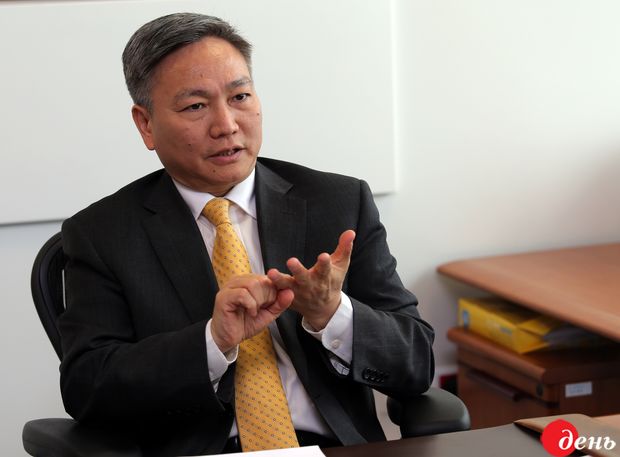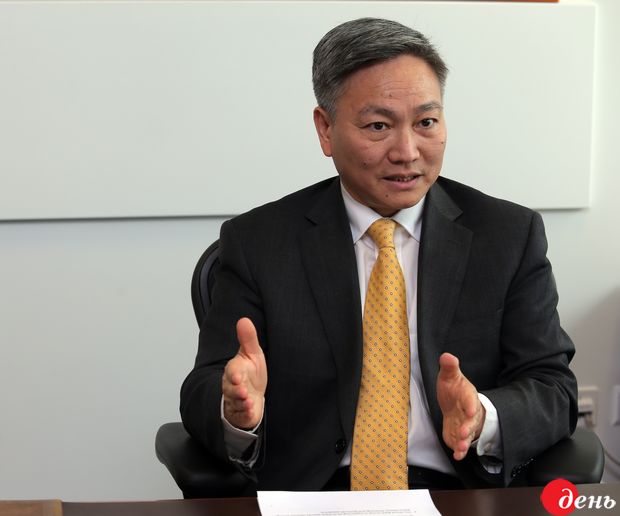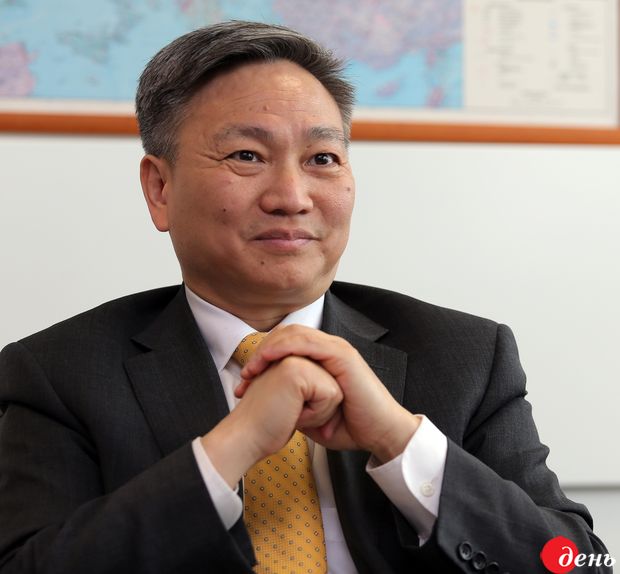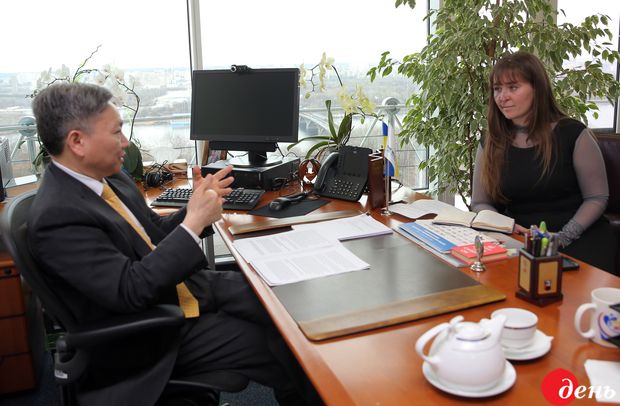The IMF loan has made it possible for Ukraine to further cooperate with and receive funds from other international organizations, including the World Bank (WB). The latter has been carrying out a series of projects in Ukraine for many years. But its activities are not confined to this only. The bank and its experts are also the government’s longtime consultants in the implementation of reforms. Have the current evens and the military conflict in this country affected the WB’s investment plans? Which of the Yatseniuk Cabinet’s reforms does the bank consider successful or disastrous? Why is the Anticorruption Bureau not a panacea against corrupt officials? This and many other points is the subject of an exclusive interview with Qimiao FAN, the World Bank Country Director for Belarus, Moldova, and Ukraine.
What do you think about the development of Ukraine’s economy in the past year?
“The year was not simple. It issued a lot of challenges. First of all, it is the military conflict in eastern Ukraine. But even before this, in the past two years, the national economy has been in stagnation. This has also exposed major structural problems. And the unfavorable external environment in 2014 only aggravated the situation.”
Do you see any cause for optimism?
“The government has launched a series of reforms, which has stabilized the economy. But the situation is still difficult. If Ukraine continues to carry out reforms and restores sustained development, it will be able to realize its tremendous development potential in the long term.”
In which sectors do you see positive and negative changes?
“The formation of public utility rates, including electricity and fuel charges, is more transparent now. There are obvious successes in business deregulation. The banking sector has begun to be restructured and stabilized. The country has opted for a floating exchange rate. These elements are important for the stabilization and renewed growth of the economy. These reforms should have been carried out 20 years ago. But the government has begun to do this only now. The first steps are correct, and reforms should be continued.
“More efforts should be made in fighting corruption, particularly in the judicial system. You should stop such a widespread thing as unauthorized seizure of facilities. Of course, the state should continue reforming the energy sector, without confining itself to utility rates only. The gas sector needs to be restructured. Dividing Naftohaz Ukrainy into companies that separately deal with the production, transportation, and sale of gas would be a right step, as far as the fiscal balancing of Naftohaz’s budget and the country’s energy effectiveness and energy security is concerned. The government should also begin to restructure and recapitalize the banking sector. In spite of the successes, there still are many questions about business deregulation. It is necessary to continue reducing the number of licenses, certificates, and permits, as well as to make sure that the poor and unprotected strata of the population receive social benefits in the course of reforms.”

Yet quite a lot of experts criticize the Cabinet because they think its actions are ineffective. Which sectors do you think the government is reforming with the signs of “plus” and “minus?”
“I don’t think we should appraise this by a certain scale. It is important that reforms have begun and are going on. It would be also wrong to expect them to produce immediate effect (except for social benefit cuts). It takes time to see the result. So, the government should arm itself with patience and send clear messages to the populace about why it is doing one thing or another and say what results can be expected and when.”
Has the IMF’s decision to give money influenced the WB’s plans of further cooperation with Ukraine?
“The World Bank was and still is Ukraine’ long-term partner at this difficult time. We are one of the largest international investors. Our active credit portfolio, which has reached 6 billion dollars (we have rendered financial aid worth 3.1 billion dollars in the past 10 months), consists of investment projects aimed at improving the quality of basic governmental services to the populace, such as water supply, water purification, heating, energy supply, road repairs, and healthcare. Carrying out the urban infrastructure project alone has allowed four million Ukrainians to gain access to high-quality water in the past few years. We still preserve our plans, announced in February 2015, to give Ukraine 2 billion dollars. Some of these funds will go to the budget, and the rest will be used to support reforms.”
The World Bank is prepared to give Ukraine one more $500-million loan to develop the financial sector, but the problem is with the Ukrainian side. Would you explain what is causing the delay?
“It is about the development policy loan. This money in support of reforms is allotted in two parts and is made available only after the country has taken some concrete steps in economic reformation. This kind of funding is supposed to improve transparency in public-sector management, simplify the regulatory policy, and reform the ineffective system of subsidizing the poor.
“The first part of this program, worth 750 million dollars, was approved by the bank’s board of directors in May 2014. The program’s second part (500 million dollars) is under preparation now. The government must fulfill several conditions to get these funds: to introduce changes to the fiscal policy, improve state-run project management, introduce changes to the law on the auditing chamber so that the latter could also audit budget revenues, pass the laws on investors’ rights protection, and increase independence of the national energy regulator.”

In other words, the ball for receiving 500 million dollars is in parliament’s court?
“Yes. The issue of a $500-million loan depends on how soon the necessary legislative changes will be made. It is about five laws.”
Are there any other obstacles that hinder the bank’s work in Ukraine?
“On the whole, we maintain very good relations with the government. We can discuss very fairly and openly any question with the premier, the [parliament] speaker, and the Presidential Administration. But the situation in the country is still difficult, which creates a number of challenges to the implementation of our projects. The first of them is that some projects need to be co-funded by the state budget (for example, road construction). There is lack of funds from the Ukrainian side due to a difficult financial situation. It is usually a matter of several million dollars. The second challenge is a frequent replacement of governmental officials in charge of the implementation of World Bank-funded projects. New ministers come after parliamentary elections – they need time to study everything again. This has a negative effect. The third challenge is overregulation of governmental support procedures for new projects. It may take too much time to restructure one project. The new government is already working, and I hope the country will be stable at last.”
You said unauthorized seizures are one of the major challenges. In what sectors of the economy do you think it is on the increase?
“There have been unauthorized seizures almost in every sector for many years, and I do not see that they have stopped. We have put up this problem to the government, but it is not so simple to solve it because the root cause is, above all, in the legal sphere and in the corrupt judicial system.”
This means it is necessary to change the judicial system and organize adequate work of the Anticorruption Bureau?
“There should be an integrated approach. First of all, the judicial system should be reformed. Then the execution of the current laws should be improved. And, finally, real punishment must be meted out to the guilty. You don’t need to wait for the Anticorruption Bureau to catch and punish corruptionists. There are proper laws in Ukraine to prosecute corrupt officials. The only question is to apply these laws.”
Past year the World Bank issued money for the Fund for Guaranteeing Natural Persons’ Deposits (FGNPD). Do you think this money is being used effectively? Do you support the NBU’s decision to withdraw the problem banks from the market instead of bailing them out?
“It is about the Development Policy Loan (DPL) to support the financial sector. This financing is aimed at strengthening the Fund’s regulatory potential, supporting its efforts to set up a solvent banking system via stress-testing the largest banks, recapitalizing or restructuring them, helping to improve the regulatory system and the ability to monitor banks in the long term. Money is allotted to the Fund as part of two DPL projects. The World Bank’s Board of Directors has approved the first project worth 500 million dollars, and the money was remitted to Ukraine’s budget in August 2014. The second $500-million project is under discussion now.
“Naturally, we monitor the way our money is used. As the money is remitted to the budget, the World Bank checks whether the current laws can guarantee the normal work of the FGNPD. What interests us is the Fund’s ability to quickly pay deposits to all the insured depositors. The money is being used effectively now. While only 2 insolvent banks were transferred to the Fund before the beginning of 2014, there were 46 such banks from January 1, 2014 onwards. It is a big load, but the Fund copes with it owing to its increased financial potential. I think more problem banks will be transferred to the Fund in 2015. For this reason, it should work still more effectively and increase funding.”

Is the World Bank prepared to increase, if necessary, its infusions into the Fund under this program?
“We have reserved another 500 million dollars for these purposes. Further funding will depend on two factors – the government’s ability to keep the macroeconomic situation stable and continue reforms.”
Will the bank continue to finance the land cadastre project?
“The World Bank supported the idea of a land cadastre. Thanks to this, Ukraine received one of Europe’s most sophisticated electronic cadastre systems. Its database comprises all information about private land plots.”
Experts have a somewhat different opinion: they are saying there are still many mistakes in the cadastre. For example, there are errors about land plots, and the electronic database is not filled completely. Accordingly, the cadastre cannot work effectively, and it is impossible to launch a land market on its basis.
“The cadastre is 100-percent ready and works successfully. This system comprises information about 100 percent of all private land plots. There are only no data about state-owned lands. Therefore, the government should take an inventory of its lands as soon as possible because no one knows at the moment how many of them are there and where they are located. And it is a big chunk. From the technical angle, this cadastre system is very progressive. But it can only be useful and effective if it is used.”
A debate is underway in Ukraine now on whether or not to open the land market. What do you think?
“In the long term, there should be a free market of farmlands. But it is necessary to pass the laws that will allow a transparent trade in land. There still are a lot of barriers today to opening a free market of land. If Ukraine does not take them into account and launches the land trade too soon, it may face a number of problems. I wouldn’t like to see this. It’s not worthwhile to rush to open the land market. It’s better to focus on making effective laws.”
What about plans to invest, jointly with the EBRD and the EIB, in the modernization of the gas transportation system?
“To attract investments in the gas sector, one should first improve the system’s financial viability. It makes no sense for the EBDR, the EIB, or the WB to invest money in financially unviable sectors or businesses. How can this be changed? Firstly, public utility rates should be raised to an economically justifiable level. The Cabinet is trying to do so. Secondly, the gas sector should be comprehensively restructured, and the production, transit, and sale of gas need to be separated. Naftohaz Ukrainy should improve its performance. It must work transparently.”
Can you see any progress in reforming the energy sector?
“The government has begun to raise utility rates. It is an important first step. The next one on the line is implementation of the Naftohaz Ukrainy restructure plan the Cabinet approved a few weeks ago. Only then we’ll be able to speak about investments in the sector.”

Given the current pace of energy sector reformation, can we expect investments from the WB and other international institutions to come before the end of this year?
“There are some signs that we can. But I am aware that restructuring the gas sector in any country, especially in a problem-stricken Ukraine, is a very difficult task. This can’t be done overnight. It will take several years to do so. But it seems to me that if the government and Naftohaz Ukrainy begin to take real steps to restructure the sector, the world will receive a very powerful signal about the seriousness of these reforms. Then you will see new investments in the energy sector. There are no reasons why Ukraine’s gas sector cannot be profitable.”
Can the rise in household gas rates solve the problem of the ineffective use of energy by public utility facilities?
“The gas price is the best instrument to stimulate energy effectiveness. On the one hand, this creates stimuli for centralized heating companies. For the more expensive the gas is, the more buildings attached to centralized heat supply systems will be installing heat meters. Accordingly, public utility units will not afford to lose gas due to low production efficiency or high losses in the main lines. To remain on the market, these companies will be investing in a better quality of the grid and in energy effectiveness. On the other hand, households will get a stimulus and will be pressuring the utility offices to take a more responsible approach to the quality of the services they render. Besides, the government must not forget about its duty to carry out the programs of helping the poor residents who are unable to pay then increased charges.”
Ukraine can see the beginning of a struggle against the dominance of monopolies and oligarchs. What makes one think so is the return of Ukrnafta and Dmytro Firtash’s titanium assets under state control. What do you think is going on? Will Ukraine be able to achieve a new economic level without revising the antimonopoly legislation?
“Many problems in Ukraine are the result of an oligarchic economic structure. In the past, oligarchs controlled many sectors of the economy and exerted strong influence on governmental policies and the law. Ukraine must solve this fundamental problem in some way. In other words, the government must break the backbone of the oligarchic economy. How can this be done? Firstly, it is necessary to adopt transparent laws that will ensure equal conditions of the game for all the businesspeople who will not wish to be under the influence of one or several oligarchs. Secondly, there should be a maximally transparent procedure of lawmaking and governmental policies. Thirdly, it’s necessary to form an attractive investment environment, where the foreign investor will not fear to come to and small and medium businesses will be able to flourish. A series of laws should be adopted as well. There was a long dispute in the past about transfer price formation which oligarchs used in order to smuggle their profits out of the country. A law was finally passed, but this is not enough – this law must be applied fully and transparently. This will in fact be a resource for investments in the infrastructure, road construction, water purification, and other needed projects.”
In other words, the era of oligarchic monopoly in the Ukrainian economy and politics is to come to an end?
“Yes. It is very important that Ukraine should at last create a powerful competitive field and economy with equal conditions for everybody. This is the only way to put the country on the path of sustained development. Ukraine has an enormous potential, but, to realize it, the government must continue to carry out difficult reforms. You are on the right track, and the Word Bank is ready to help and support Ukraine in this.”







